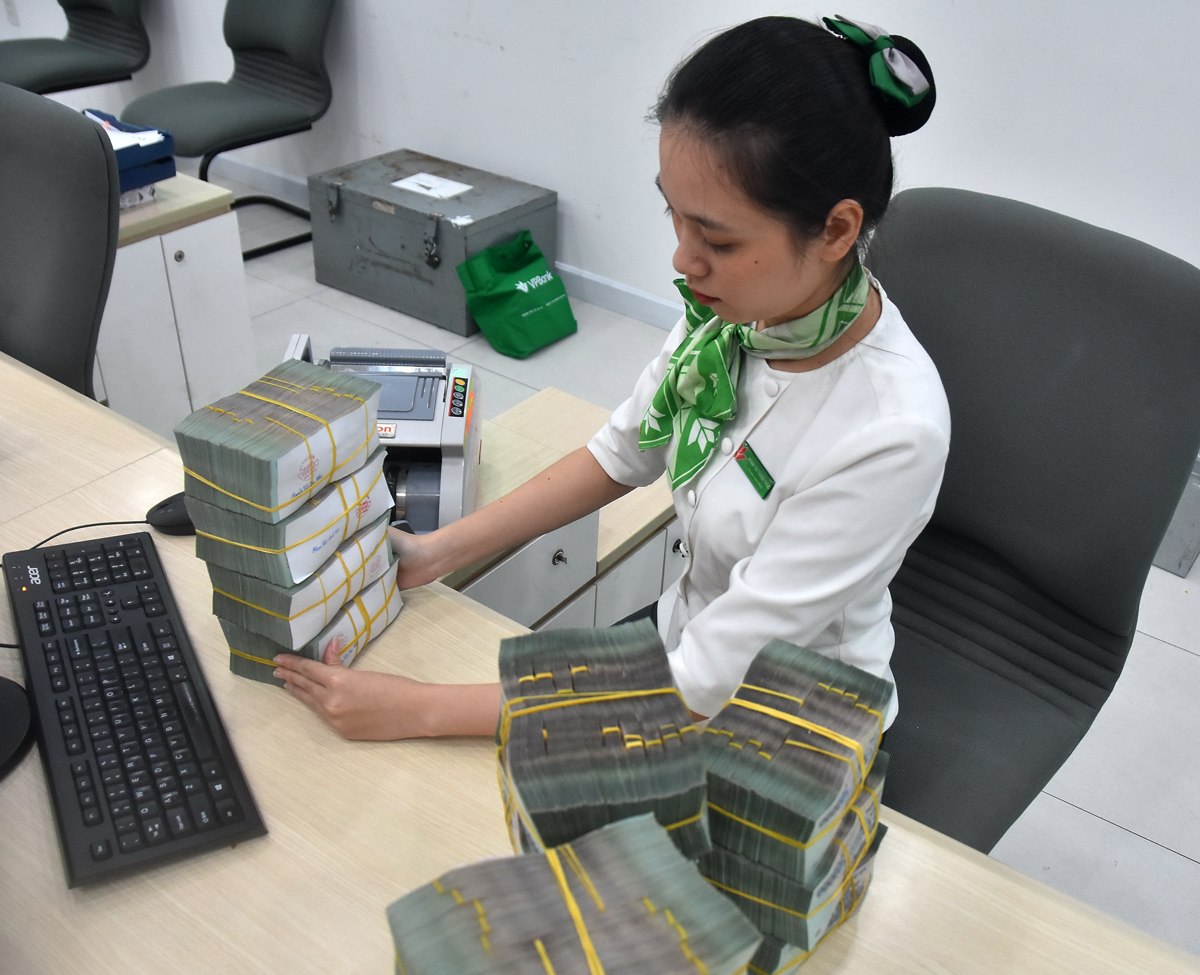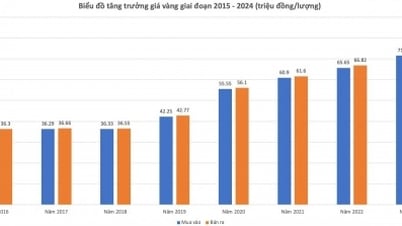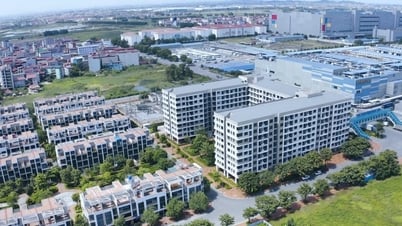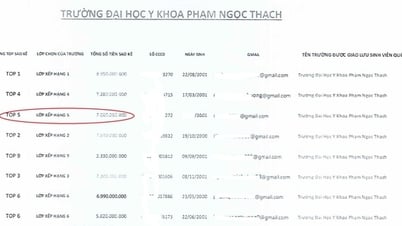Bad debt increases in the context of customers' production and business difficulties, forcing many commercial banks to rush to sell mortgaged assets and increase credit provisions...
Selling all kinds of mortgaged assets
Joint Stock Commercial Bank for Foreign Trade of Vietnam ( Vietcombank ) North Binh Duong Branch has just announced the auction of secured assets which are land use rights, house ownership rights and other assets attached to land in Binh Duong province of an individual customer, with a starting price of over 10.3 billion VND. This bank is also auctioning secured assets which are real estate of Goldfish Investment and Development Joint Stock Company with a starting price of over 7.1 billion VND.
Not only real estate, Vietcombank Bac Binh Duong Branch also auctioned assets such as machinery and equipment, such as the coffee production line of Katomi Vietnam Company Limited. Vietcombank Thu Duc Branch (HCMC) auctioned machinery and equipment of Viet Mechanical Construction Trading Company Limited with a starting price of 1.3 billion VND. These assets have been seized by the Thu Duc City Civil Judgment Enforcement Department.
Many other commercial banks such as BIDV, Agribank , VietinBank, VIB, Sacombank... also promote the sale, liquidation, and disposal of mortgaged assets such as townhouses, apartments, land, machinery, equipment, factories... However, not all assets or debts that are put up for sale can find new owners.

Commercial banks are actively handling debt to reduce bad debt in the system. Photo: TAN THANH
Vietnam Joint Stock Commercial Bank for Investment and Development (BIDV) has just auctioned the 50th secured assets of Thuy Dat Joint Stock Company, including printing lines, machinery and equipment in the garment industry. Vietnam Joint Stock Commercial Bank for Industry and Trade (VietinBank) auctioned the 14th debt of Phuc Dat Joint Stock Company in Hai Duong province. The debt value is over 161 billion VND including principal and interest, in which the secured assets are the factory system, warehouses for raw materials, etc.
A credit officer at a state-owned commercial bank in Ho Chi Minh City said that since the beginning of 2023, business activities of both individual and corporate customers have been difficult, leading to an increase in bad debts. His main job in recent times has been to sell assets and file lawsuits to recover debts, not simply lend money as before. However, debt settlement is not easy because the real estate market is still facing many difficulties and transactions are poor.
Speaking to a reporter from Nguoi Lao Dong Newspaper, the head of a transaction office of a bank based in Tan Binh District, Ho Chi Minh City, said that since the beginning of the second quarter, bad debt has increased sharply, mostly from real estate debt. Credit officers are trying to find borrowers to disburse, increasing outstanding loans to reduce the bad debt ratio. However, there are very few new borrowers. Old customers do not borrow more because of poor consumption.
Many solutions to limit the increase of bad debt
During the recent bank shareholders' meeting season, many bank shareholders expressed concern about increasing bad debt in the context of economic difficulties, both individual and corporate customers are facing difficulties.
Mr. Thanh Tung (residing in Dong Nai province) said he has a consumer loan secured by his salary at a joint stock bank. However, in recent months, the company has had little work, income has decreased, and his loan is at risk of becoming bad debt. "The bank staff said that if the loan is not paid on time, they will come to the house to work with the family, and if the loan becomes bad debt, they will file a lawsuit according to regulations," Mr. Tung worried.
Mr. Nguyen Quoc Hung, General Secretary of the Vietnam Banking Association (VNBA), said that the current bad debt situation of credit institutions is very worrying in the context of difficult business conditions and signs of global economic recession. The amount of debt that needs to be restructured, adjusted to reduce debt, and not yet transferred to a debt group is not small and has the potential to become bad debt.
"If in 2022, the banking industry is worried about liquidity, in 2023 it will face the risk of bad debt. Meanwhile, the sale of secured assets, especially large debts that require debt sales at market prices, is difficult to implement in the context of low liquidity in the real estate market. At this time, it is necessary to continue to remove difficulties and obstacles related to the legal corridor so that the Debt Trading Floor of the Asset Management Company of Credit Institutions (VAMC) can promote its effectiveness and become a vibrant bad debt trading market," Mr. Nguyen Quoc Hung suggested.
To limit the increase in bad debt, in addition to extending debt for customers for no more than 12 months according to Circular 02/2023 of the State Bank, some commercial banks are looking to swap debts of customers who have borrowed from many other banks with an amount of thousands of billions of VND. For example, V. Bank, headquartered in Hanoi, has just approved a credit limit of nearly 10,000 billion VND for a company specializing in investing in the construction of transport infrastructure.
Accordingly, this bank bought nearly 9,000 billion VND of debt that the other company was borrowing from many other banks to pay off the debt. These banks will recover capital, limiting the increase in bad debt. Bank V. will also increase outstanding loans, meaning the bad debt ratio will decrease. This company will start with a new loan at Bank V. with low interest rates, and at the same time pay off debts at other banks.
From a management perspective, the State Bank has just issued a directive on strengthening credit operations, implementing a policy of restructuring debt repayment terms and maintaining debt groups to support customers facing difficulties. Accordingly, banks need to promote restructuring debt repayment terms and maintaining debt groups to support customers facing difficulties in production and business activities and customers facing difficulties in repaying loans for living and consumption needs.
According to Mr. Nguyen Quoc Ky, Chairman of the Board of Directors of Vietravel Corporation, most businesses are losing money after 2 years of the pandemic. If the regulation on loss-making businesses is maintained, banks will not be allowed to lend or if they do lend, they will have to set aside risk reserves, and support policies will be difficult to implement. This explains why there is no shortage of policies and regulations issued but banks still have excess capital and businesses still lack capital.
"To achieve economic growth as targeted, breakthrough policies are needed. First, there needs to be a breakthrough in credit - which is the "oxygen valve" for businesses," Mr. Nguyen Quoc Ky suggested.
Looking at it from a more optimistic perspective, Mr. Truong Hien Phuong, Senior Director of KIS Vietnam Securities Company, said that although the bad debt ratio has increased, it is not too serious. Because the nature of this bad debt is not due to bank management but due to the difficult context of the real estate market and corporate bonds. Many banks have experience in handling bad debt well such as Sacombank, Vietcombank, BIDV...
"The Government and the State Bank have had many solutions to remove obstacles for the real estate market and corporate bonds, so when this market "warms up", businesses with cash flow can pay off loans to banks, contributing to solving the problem of bad debt" - Mr. Truong Hien Phuong expected.
Debts need attention increase sharply
Fiingroup's statistics from 27 listed banks show that the bad debt ratio has slightly increased from 1.4% at the end of 2021 to 1.5% at the end of 2022. However, the ratio of debt requiring attention in group 2 increased sharply to 1.8% and the rate of new bad debt creation was at its highest level in the past 4 years. Meanwhile, the buffer for loans classified in groups 3-4-5 showed signs of thinning as the bad debt coverage ratio dropped sharply to 123.1%.
The sharp increase in debt requiring attention at many banks shows that asset quality is deteriorating. Banks will continue to face pressure to set aside risk provisions in the coming time if the real estate market and corporate bonds do not show positive signs.
Source


























![[Photo] Nearly 104,000 candidates in Hanoi complete procedures to take the 10th grade entrance exam](https://vphoto.vietnam.vn/thumb/1200x675/vietnam/resource/IMAGE/2025/6/7/7dbf58fd77224eb583ea5c819ebf5a4e)





























































![[OCOP REVIEW] Tu Duyen Syrup - The essence of herbs from the mountains and forests of Nhu Thanh](https://vphoto.vietnam.vn/thumb/402x226/vietnam/resource/IMAGE/2025/6/5/58ca32fce4ec44039e444fbfae7e75ec)







Comment (0)